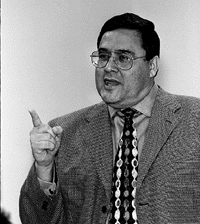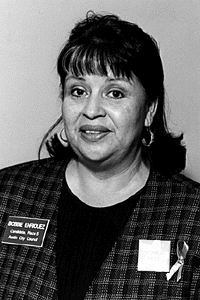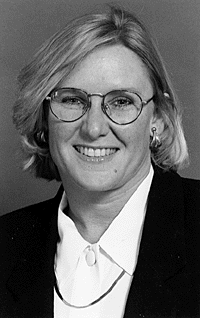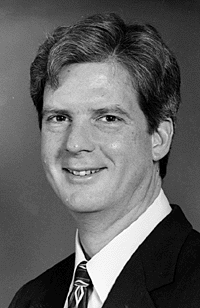Zeroing in on Zuniga
Place 5 CandidatesTarget the Man With the Money
By Amy Smith, Fri., April 18, 1997
|
|
"This campaign is getting to be more and more fun," Hadden beamed out over the crowd of some 50 people. She noted that the work going into her grassroots operation is a "100% volunteer" effort. Then, Hadden very quickly launched into what has become a familiar theme on the campaign trail: Beating Manuel Zuniga, the most formidable and heavily financed contender in the race for the Place 5 council seat.
"Zuniga is not a candidate who will support the people," said Hadden, a schoolteacher and activist. "I don't think that he has any feel for the ordinary citizens of Austin."
Two nights later, at a swank private residence a couple of miles down the road from the clubhouse, Bill Spelman -- who is considered to be Zuniga's toughest rival -- stood tall and reed-thin on the front steps of the home and looked out earnestly over the heads of fundraiser supporters gathered on the front lawn. Spelman expressed concern that Zuniga, who is in the lumber supply and homebuilding business, would -- if elected May 3 -- steer Austin further down the path of misguided growth. "He's willing to open up his checkbook to do whatever it takes to win this election," Spelman said of his wealthy opponent.
And earlier this week, at a fundraiser at El Sol y La Luna, another Place 5 candidate, Bobbie Enriquez, sounded the same alarm. Voters must rise up and vote against Zuniga, she told supporters.
Only Gus Peña, who rounds out the field of five candidates in the race, states that he's running against all four of his opponents, and not just Zuniga.
Why is Zuniga Public Enemy No. 1 in the eyes of at least three of the hopefuls?
"Because," explains Zuniga in a voice rich with swagger, "I'm so far ahead of the other candidates. "You have to shoot the guy who's in the lead -- that's politics." He says a telephone poll conducted over a two-day period last week placed him "overwhelmingly" in the lead, though he won't disclose many specifics. If Zuniga's poll results are close to the mark, the other candidates still have a fighting chance of appealing to voters; the survey did show that more than 50% of respondents were still undecided on their candidate of choice for Place 5, Zuniga says.
Indeed, Zuniga's numbers are higher and his name identification greater, in part because he's been running longer than the other candidates. He made his first try for council in last year's Place 1 race, placing a respectable third behind victor Daryl Slusher and Jeff Hart. "It was pretty comfortable last year because I was third and nobody was out to get me," he says. "But this time I'm it. I'm the target of the attacks, but I have to try and not take them personally."
|
|
To be sure, there are more issues besides Zuniga in the Place 5 race. Spelman and Hadden are two Anglos trying to secure a seat that has historically gone to a Hispanic as part of a citywide gentleman's agreement -- a long-standing tradition that Councilmember Gus Garcia broke from when he bailed out of his Place 5 seat to make a run for Place 2.
Both Spelman and Hadden have vowed to work toward the creation of single-member districts -- a voting method that would better ensure minority representation on the council -- if they win the election. Still, by most accounts, they do not appear to have the support of many Hispanic backers.
Zuniga asserts that the Hispanic community is so worked up over the threat to the gentleman's agreement that he and either Enriquez or Peña -- the other Hispanic Place 5 candidates -- will end up in a run-off.
That Zuniga is Hispanic is a point in his favor. Plus, he is not the evil monster his opponents have portrayed him to be. In person, he is friendly, although a bit oafish and bumbling, and politically naïve. But it's this naïveté that some observers fear will leave him vulnerable to the powerful influences of development interests. After all, a fair amount of real estate money has already served to fatten his campaign war chest. "I didn't even know Bill Milburn, but I called him on a lark and he gave me $2,000," Zuniga says proudly of Austin's longtime homebuilder.
The development contributions to Zuniga are a legitimate cause for concern. In this day and age, it's not just environmentalists but Austin's moderate, politically unaligned citizens who are growing increasingly wary of the city's willy-nilly growth patterns. Says Spelman's consultant, Mark Yznaga: "All the polling for the last two years has shown that growth is the issue. There is a quiet desperation among people that we need to do something soon, in this election."
Also, the environmental community fears that Councilmember Jackie Goodman has abandoned the green voting bloc on the City Council that in better days usually guaranteed a four-vote majority. "There just aren't four votes on the council that can be counted on any longer," Yznaga laments.
But Zuniga explains his contributions from the real estate industry this way: Mayoral candidate "Kirk Watson has a lot of contributions from lawyers. Well, of course -- he's a lawyer. I'm in the homebuilding industry, so of course I'm going to get contributions from people in my industry. It's a fact of life."
Nobody doubts that Zuniga would bring some financial talent to the table, and Lord knows the city could use some smarts where unwieldy budgets are concerned. Zuniga says that if he is elected, the city would benefit from his skills at running a successful business, and his past experience serving on the electric utility commission. "The utility is the most important issue facing Austin right now, and I would make it a priority to run it and the city like a profitable business." But his opponents are quick to point out that, as an electric utility commission member, Zuniga voted in 1994 to raise rates for residential and small business customers while letting large industrial consumers continue with their discounted rates. Zuniga says he stands behind that decision and adds that the city council did, too. (On the other hand, Zuniga says he would have voted against the recent FAIR deal, which granted rate breaks to Austin's six largest corporate customers).
|
|
"That was definitely an error," Zuniga now acknowledges. "I made that statement about how much I make an hour and people found it offensive -- and I don't blame them. But the point that I was trying to make is that I think the Place 5 seat should remain a Hispanic seat and that I have the resources needed to retain the Hispanic seat. I talk and many times -- sometimes -- I shouldn't. I need to be careful about what I say, but not to the extent that I'm not honest."
Another Zuniga blunder occurred last week when he described himself to a Chronicle reporter as just your average "old and boring" guy who goes to work every day, owns some property, and pays his taxes. Whoops. The next day, the
Statesman reported a $281.97 property tax bill he had neglected to pay (even after a court order last November) until the daily brought it to his attention this month. "It's not like it was a minor thing," Zuniga conceded to the newspaper. "It's a serious thing."
Many Place 5 watchers are betting on a run-off between Zuniga and Spelman. But Zuniga predicts that, based on his own polls, Spelman won't fare nearly as well as his camp believes. But then, that's what candidates are supposed to say about their strongest opponent, isn't it? Of course, Spelman, who made an unsuccessful run last year for an Austin Community College board seat, did enter the race rather late, and that could be a detriment in raising both name identification and campaign funds.
As an associate professor at the University of Texas, Spelman may have some trouble playing down his ivory tower demeanor. He is a Harvard University graduate with a master's and a doctorate degree in public policy. He has served on a handful of community boards and commissions, but there are some -- Hadden and Peña supporters for example -- who believe that he has not sufficiently earned his stripes as a dedicated activist. Spelman did gain ground among the progressive/enviro contingent, many of whom are backing him in this race, after he spoke out last year against ACC's proposed purchase of the environmentally sensitive Shadowridge tract over the Edwards Aquifer contributing zone. And he can boast of extensive teaching and writing experience in the realm of public safety and criminal justice issues.
Spelman, whose scholarly background includes an emphasis on urban economic development, is probably the strongest of the bunch in presenting himself as a long-range planner bent on reining in urban sprawl. "I'm not running just because I love Austin. This isn't just about Austin, it's about Dallas and Houston and Phoenix and L.A.," he says, noting how Austin is just a few years behind those traffic-clogged cities. "There are people out there who just don't see that we have a problem in relation to growth," he adds.
As for Enriquez' campaign, the candidate has distinguished herself by her ability to raise a fair amount of money -- $11,490 -- in just a little over a month's time. That compares to the $12,320 Spelman raised in more than two months. Still, Enriquez has been compared to an unguided missile; there is a sense that she was pushed into the race at the behest of her former boss, Councilmember Gus Garcia. Apparently, Garcia and Zuniga had had a heated argument after Garcia began having second thoughts about leaving his Place 5 post. Zuniga, who had designs on the seat he figured Garcia would vacate, had openly expressed his disappointment that Garcia might stay put. And Garcia didn't appreciate Zuniga publicly expressing his dismay. Hence the big fight, and hence Garcia's encouragement of Enriquez to enter the race against Zuniga.
|
|
In other matters, Enriquez is scoring points as a Hispanic woman and a single mother who is committed to working for what she calls the forgotten agenda -- the single working moms who desperately need services like affordable child care and job training. Enriquez makes the impressive and impassioned point that the agenda of this low income group, and that of other oft-ignored communities, gets lost amid the trendier issues of the day.
For her part, Hadden has made great strides in her campaign and has actually fared better than some observers believed she would as a first-timer. Hadden is a council regular whose mission it is to nettle certain councilmembers (Mayor Bruce Todd, in particular) with whom she is diametrically opposed. She won a lawsuit against Todd last year that charged the mayor with violating her First Amendment rights to free speech when he barred her from speaking at council meetings. Hadden has tempered her vocal outrage considerably since launching her bid for office. Additionally, Hadden has a phone bank up and running, a direct mail campaign in the works, and an ambitious number of volunteer block walkers. Her loyal following includes a lot of anti-helmet bicyclists, thanks to Hadden's vow to work to repeal the helmet law as well as the no-camping ordinance. Further, Hadden advocates the city turning its attention to helping small business owners and letting the big companies pay their own way on relocation and expansion projects. She also enjoys strong commitment from the environmental community and shares a key Save Our Springs endorsement with opponent Spelman.
Finally, Peña, who has been long committed to the community, is running his campaign the best way he knows how: with his own two feet. "I'm walking neighborhoods north, south, east and west," he says. Peña's dedication to righting social ills is reflected in his endless volunteer work: He is a volunteer advocate at the Gardner-Betts juvenile facility; he assists law enforcement agencies in identifying high-crime and high substance abuse areas of the city; he is committed to ending environmental racism in East Austin. He has raised far fewer dollars than any other candidate -- but he likely is the most optimistic. "We're going to win this race," Peña declares, "because God is driving our bus."
That bus will make its first stop May 3. That's when there will likely be only two candidates remaining for that final ride into the May 31 run-off.
Got something to say on the subject? Send a letter to the editor.












